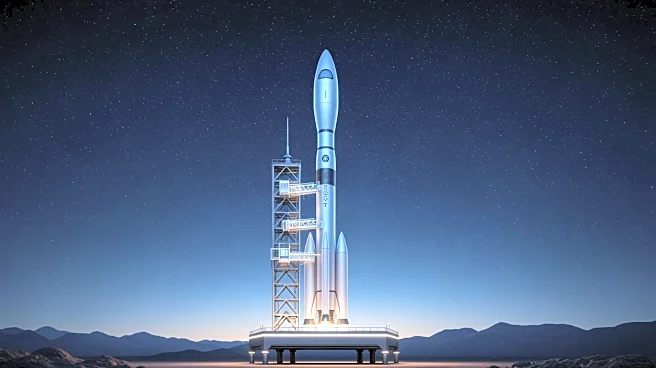What's Happening?
Blue Origin, the private space company founded by Jeff Bezos, is preparing for the second launch of its New Glenn rocket. Scheduled for November 9, 2025, from Florida's Space Coast, this mission will propel
NASA's twin ESCAPADE spacecraft to Mars. The New Glenn rocket, named after astronaut John Glenn, is one of the largest active rockets in the U.S., standing at 322 feet tall. The mission will test Blue Origin's heavy-lift launch system, which is designed to compete with SpaceX in the commercial orbital spaceflight market. The launch will also attempt to land the first stage booster on a drone ship named Jacklyn in the Atlantic Ocean.
Why It's Important?
The successful launch of New Glenn is crucial for Blue Origin as it seeks to establish itself as a major player in the commercial spaceflight industry, competing directly with SpaceX. The mission supports NASA's ESCAPADE project, which aims to study solar winds and space weather around Mars, contributing valuable data for future Mars exploration. Additionally, the reusable design of New Glenn's first stage, intended for at least 25 flights, represents a significant advancement in reducing costs and increasing the frequency of space missions. This launch could bolster Blue Origin's reputation and attract more commercial contracts, including satellite deployments for Amazon's Project Kuiper.
What's Next?
Following the launch, Blue Origin will focus on the landing of the first stage booster, a critical component for the rocket's reusability. Success in this area could lead to more frequent and cost-effective launches. Blue Origin plans to continue developing its space technology, including human lunar landers, and expand its capabilities in the commercial spaceflight market. The outcome of this mission may influence future collaborations with NASA and other commercial entities, potentially leading to more ambitious projects and increased competition with SpaceX.
Beyond the Headlines
The development and success of Blue Origin's New Glenn rocket could have broader implications for the space industry, including increased competition and innovation. As private companies like Blue Origin and SpaceX advance their technologies, they may drive down costs and increase accessibility to space, potentially leading to new opportunities for scientific research and commercial ventures. The focus on reusability and sustainability in rocket design also aligns with global efforts to reduce environmental impact and promote responsible space exploration.










